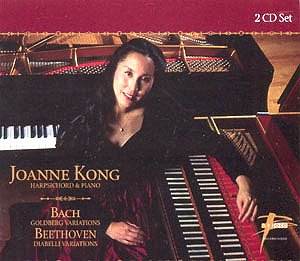This recording, which strives for uniqueness by combining,
in one set, Bach’s Goldberg Variations and Beethoven’s Diabelli
Variations ("for the first time"), does not achieve uniqueness,
but rather presents two somewhat fragmented, almost deconstructed performances.
Kong’s overly-staccato playing, coupled with the sound
of the harpsichord (lots of treble and very little bass), make the Goldbergs
sound as though they are more an exercise in style. Since the "variations"
in the Goldbergs develop around the bass notes, the weakness of the
lower range of the instrument removes the sense that these pieces are
related. This is especially evident in the sixth variation, where the
lower end of the instrument is essential - this harpsichord just does
not sound good in the lower range.
Kong plays these works, but does not interpret them.
Her reading of the third variation, for example, is wooden and uninspiring,
as she sticks too closely to the rhythm that is written in the score,
and adds no emotion to the music. But in the sixteenth variation, Kong
provides an attractive reading, perhaps because this variation uses
a higher register than many of the others - its bass notes are in the
middle of the keyboard, and the performance does not suffer from the
unbalanced sound of the harpsichord. Yet the litmus test for the Goldbergs,
the twenty-fifth variation, is a disappointment. The harpsichord sounds
tinny at the highest range, where this variation is performed, and Kong
offers little original colour or feeling.
The Diabelli Variations, after listening to
the Goldbergs on this set, come alive with much more energy and feeling.
First of all, the piano used sounds good, whereas the harpsichord for
the Goldbergs was not. Kong still performs with a bit of rigidity, which
can be clearly heard in the opening Theme. But she seems more comfortable
with the wide variety of tempi and rhythm offered by the Diabellis than
the tighter structure of the Goldbergs. She shows a fine palette of
feeling and touch with the different variations here, such as the light
second variation and the more forceful seventh variation.
If the twenty-fifth variation is the litmus test for
the Goldbergs, the twenty-fourth could be called the same for the Diabellis.
This fughetta calls for the most sensitive feeling and touch;
Kong performs this admirably, using subtle dynamics and intensity. The
same is the case for the thirty-first variation, the longest in the
set, which sounds enticing.
Joanne Kong’s attempt to combine these two monumental
sets of variations is only partly successful. Her Diabellis far outshine
the Goldbergs, partly because the harpsichord used for the latter has
a poor sound, and partly because Kong does not manage to express enough
emotion on the harpsichord. Her Diabellis are, however, a competent
recording, and deserve attention. This set is fifty-fifty; one good,
one not so good.
Kirk McElhearn


